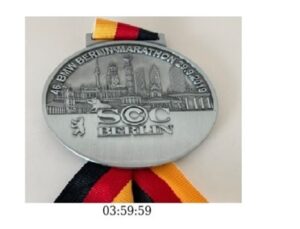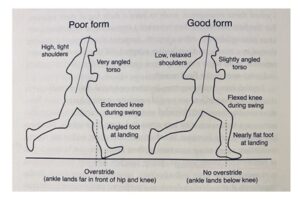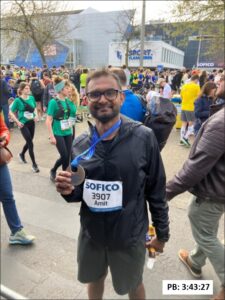I got my first taste of running over 10km in 2012 and since then I have completed 30+ half marathons and 10 full marathons. I love running, I want to do it every single day of my life. But over the years I have often asked myself whether the longer distance endurance runs are necessary for my health or more to give me a sense of accomplishment. In this article I will make an argument for why we should not confuse “running for health” vs. “running for a sense of accomplishment or achieving a life goal”. Both are very different time commitments and therefore important to think through before we choose a path. We will also look at a “Third Alternative” which in my opinion optimizes for health and time commitment.
Running for health – What amount of physical activity do you need for good health?
The U.S. Department of Health and Human Services recommend at least 150 minutes per week of moderate-intensity physical activity. These guidelines applies to all adults even the elderly and disabled. The sessions can even be broken into short 15-20 minute sessions through the week. For even more health benefits, the guidelines suggest getting 300 minutes a week or more of moderate aerobic activity. The guidelines also recommend strength training of all the major muscle groups atleast twice a week. Thus, we need a combination of 150-300 minutes of physical activity along with twice a week strength training to maintain good health.
Running for a sense of accomplishment – When does signing up for marathons makes sense?
The goal of running a marathon is lofty and challenging and the feeling one gets after finishing a half or full marathon can’t be explained in words. It is an emotion. When I started running I had never done more than 5km and thought if I could do 21km that would be amazing. So, I worked towards it. Once I did multiple 21km, then I aspired to run a marathon. The goal seemed distant and attractive. I think what urges us towards these goals is the feeling of pride, sense of accomplishment and a feeling of doing something which not many attempt. At the same time running helps improve our overall physical and mental health. For anyone who can run, I would highly recommend pursuing the half/full marathon goal at some point in your adult life.
However, in my opinion we should be careful of the timing and think through the decision before signing up. A good marathon training plan requires a minimum time commitment of atleast 500 minutes per week only for running to meet weekly mileage goals. Beyond that there is strength training and time for rest and recovery. The time commitment can go up to 10-12 hours at the peak of the training schedule. If you are single or with limited family responsibilities (no kids) then it should be easier. But with family responsibilities I believe one should think through on how they will manage different areas of their life: work, time with family, household work etc. before signing up. An upfront discussion with your spouse can be very helpful is building a good plan.
I didn’t do this planning during my initial marathons and was guilty of making the goal of finishing a marathon my primary focus for 3-4 months, which left me playing catch-up in other areas of my life. With family responsibilities, be prudent about how much time you can spend on running, ensuring other areas of your life don’t get hampered. Think of ways you would optimize time. For example, getting up early and finishing your run before anyone else wakes up is a good strategy. A smaller run (8-10k) can even be squeezed into the lunch break at office.
Once we have gone through the initial adrenaline rush of finishing a few half and full marathons, we should really take a step back to see what purpose the time dedicated to 25-30+km runs are serving in our life. If it is about health then you don’t need to run that long on a regular basis. Instead it makes more sense to mix cardio across running, cycling and swimming to ensure different muscles in the body get to move. Plus, regular strength training is much more crucial for a good quality of life than a high weekly running mileage.
The Third Alternative – Running to get to a State of Flow
For some people including myself running is about accessing the “feeling of flow” which you can get after crossing a certain minimum distance. Once you put in the initial effort to overcome the mental resistance against moving your body (getting up from your couch, wearing clothes and going for a run) which can take up to 10-15 minutes into your run, the body slowly transitions into a steady state, mind starts to become clearer and you start to feel good which I call the sense of flow. The initial mental resistance period would vary for each individual. For me the resistance lasts for 3-4 km, after which my mind becomes clearer and I can think well. This “feel good state” will continue until you physically start to tire after which the mental strength will go towards pushing oneself and to keep moving forward. If your goal is to chase the sense of flow then I think distances between 10-15km up to a maximum of 21km will fulfil that purpose on a regular basis. You would have pushed through the initial resistance, worked your way up to a steady state and finished without getting physically super tired. This is the state I try to reach on most of my runs as it optimizes for health benefits as well as time commitment plus you still have the energy for other activities during the day.
My last full marathon was in 2019 before my second kid was born. I had achieved an important milestone of a sub-4 marathon at Berlin and I decided to reduce the running distances as it took a lot of time and energy. Now my goal is to run for my health and for clear thinking while optimizing for my time. I run regularly but I no longer feel the push to train for a long distance event. My point is, run as much as you want but don’t confuse long distance running as something which you do just for your health. Yes, it helps you remain healthy but there are factors beyond health which make you pursue these events. Depending on the stage in life and what goals you are prioritizing, there are different optimal paths. Choose wisely.




